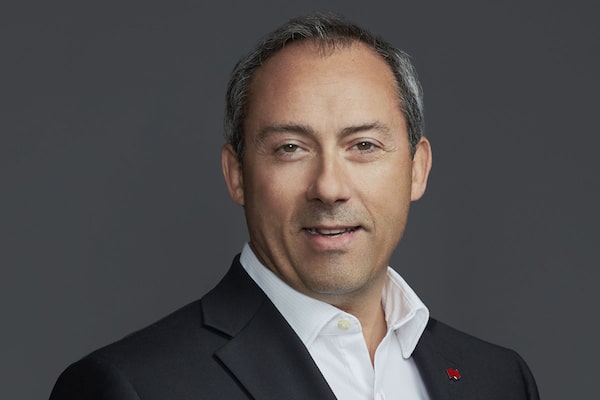
Darwin Schandor, vice-president at National Bank Private Banking 1859 division in VancouverSUPPLIED
Successful entrepreneurs and leaders spend a lifetime growing and expanding their businesses to achieve their career and financial goals and secure their family’s future, including through uncertain times.
It’s why, after decades of hard work, many are focused on the most effective ways to establish a solid and complete wealth plan to maximize what will be left for their retirement, while also leaving a legacy. It’s an important issue today as baby boomers begin transferring their wealth to the next generation.
“Many are approaching the stage of wondering ‘Where do I transfer this?’ and 'How do I transfer it?” says Darwin Schandor, vice-president at National Bank Private Banking 1859 division in Vancouver.
That’s where a trusted wealth management advisor comes in: someone you can reach out to for advice on your family and business matters and who helps to ensure your financial and estate plans are on track.
Finding the right advisor can be a challenge but there are ways to determine who could be a good fit based on what they offer and how they work with you and your family.
Here are four qualities of a great wealth management advisor and their team of experts:
1. Has the right experience
The best solution for business owners, or anyone looking to build and transfer wealth, is finding an advisor who has experience developing a holistic wealth management plan that includes financial and estate planning as well as business succession, as required.
The advisor should also be someone an investor can trust and lean on for advice, especially as family and business circumstances change.
“Anyone that has wealth should have someone in their life they can talk to who is completely neutral and unbiased,” says Mr. Schandor, whose clients include wealthy entrepreneurs, corporate leaders and inheritors of family fortunes, among others.
At Private Banking 1859, Mr. Schandor says that advisor is a senior private banker who not only works with clients but also pulls together the resources and finds the best experts to provide them with a customized suite of products and services.
2. Provides the right expertise
The best advisory teams cover all aspects of wealth management, such as day-to-day banking and investing, tax and estate planning, successorship and philanthropy, to name a few.
Private Banking 1859 prides itself on providing a single point of contact for holistic wealth planning, bringing in experts as needed, such as investment managers, lawyers and accountants.
For example, Mr. Schandor says the boutique bank is known for the strength of its investment management services, which uses third-party portfolio managers hired based on their expertise in certain asset classes and sectors.
The strategy has worked particularly well during the market volatility brought on by the COVID-19 pandemic.
The bank also provides financial literacy training for the next generation to ensure they’re prepared to receive their wealth and can manage it responsibly.
“Our clients' biggest worry is often their kids and their ability to understand the responsibility that comes with a wealth transfer and having the right people around to support them,” Mr. Schandor says. “We help to ensure they receive the right tools and advice.”
3. Appreciates the personal side of wealth planning with a human approach
Having a sound financial plan is one thing, but most investors also want an advisor who understands how their financial needs align with their personal goals and values.
One of the primary advantages of Private Banking 1859 is the personalized service, Mr. Schandor says.
For instance, the bank’s discovery process delves deep into a client’s individual plans as well as their hopes and dream for the next generation. Or, maybe the client wants to give money to a charity?
It’s through understanding and appreciating a client’s wishes that an advisor can build an effective wealth management plan, Mr. Schandor says.
“We take our role very seriously, and the more we know about our clients, the better,” he says. “A good financial plan starts with real clarity around what we need to help them… what’s happening in their life and where they’re at.”
Mr. Schandor says an advisor’s role isn’t just to manage money: “We are really in the life management business.”
4. Is proactive in keeping plans updated
A good advisor doesn’t just listen and provide proper advice but also ensures their clients stay on track with their plans.
“We’re also here to help hold our clients accountable,” Mr. Schandor says. “If there are things they need to do – getting their will updated, or ensuring they have their wealth protected – we need to stay on them. They’re very busy and sometimes this isn’t their highest priority.”
At Private Banking 1859, private bankers are responsible for staying on top of their clients' plans and tracking their progress, especially as life inevitably evolves.
“Things are constantly changing, so a good financial plan is one that’s regularly revisited,” Mr. Schandor says.
Advisors provide advice and peace of mind
It’s never soon to work with an advisor to create a comprehensive wealth management plan, Mr. Schandor says.
“People sometimes think they can just wait until the time comes to handle matters [such as business succession or estate planning],” he says. “Look at COVID-19: It’s a reminder that you never know what’s going to happen, so are you ready when something does?”
While many Canadians are humble about their wealth, Mr. Schandor says most understand the value of engaging a trusted advisor because they deliver a wealth plan and peace of mind.
“It’s important to us to facilitate that, so they have the time and the energy to continue to be successful, which benefits everyone,” he says.
Learn more about National Bank Private Banking 1859
Advertising feature produced by Globe Content Studio. The Globe’s editorial department was not involved.